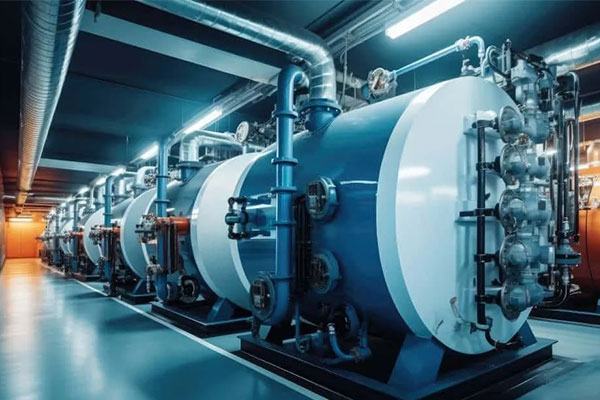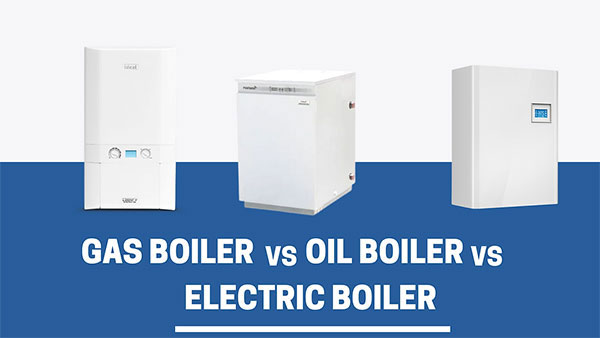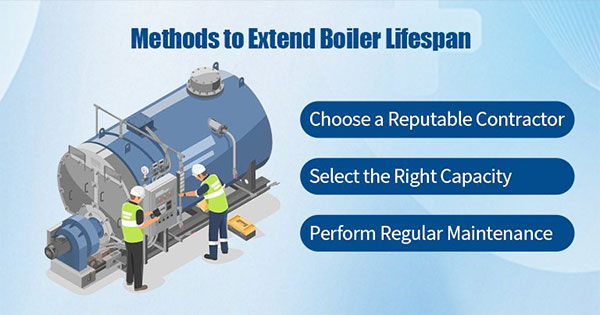Boiler Lifespan Guide: How Long Gas, Oil, and Electric Boilers Really Last
Introduction: Why Boiler Lifespan Matters
Keeping your boiler running as long as possible isn’t just about convenience—it directly affects your heating bills, home comfort, and long-term maintenance cost. Whether you’re a homeowner evaluating replacement options or a business managing a large heating system, understanding how long gas, oil, and electric boilers really last can help you plan ahead and avoid unexpected breakdowns.

This guide explains the real-world lifespan of each boiler type, the factors that influence longevity, early warning signs of failure, and practical steps you can take to extend your boiler’s service life.
1. Boiler Lifespan Comparison (Quick Summary)
| Boiler Type |
Average Lifespan |
Why |
| Gas boiler |
10–15 years |
Higher combustion stress, more moving parts |
| Oil boiler |
15–20 years |
Heavier components, slower degradation |
| Electric boiler |
20–25+ years |
No combustion, fewer parts that wear out |
These numbers assume proper installation and regular maintenance. Neglecting servicing can shorten lifespan by 30–50%.
2. Gas Boiler Lifespan: How Long Does a Gas Boiler Last?
Typical Lifespan: 10–15 Years
A modern gas boiler typically lasts 10 to 15 years. Gas heating systems operate at high temperatures and create combustion byproducts that gradually wear down internal components, especially heat exchangers.
What Affects Gas Boiler Longevity
- Water hardness: Limescale can build up in heat exchangers, causing overheating.
- Poor ventilation: Leads to incomplete combustion and carbon buildup.
- Incorrect sizing: A boiler that is too small works harder and fails earlier.
- Heat exchanger material: Stainless steel lasts longer than aluminum.
- Annual servicing: Catching small issues prevents major failures.
Signs Your Gas Boiler Is Nearing End of Life
- Increasing gas bills
- Frequent lockouts
- “Kettling” noises from limescale buildup
- Yellow flame instead of blue (improper combustion)
- Frequent repairs or obsolete parts
How to Extend Gas Boiler Lifespan
- Schedule annual professional maintenance
- Perform a power flush every few years
- Install a smart thermostat to reduce unnecessary cycles
- Replace pumps, valves, or sensors before they fail
- Keep ventilation paths clear
3. Oil Boiler Lifespan: How Long Does an Oil Boiler Last?
Typical Lifespan: 15–20 Years
Oil boilers usually last longer than gas boilers—often 15 to 20 years—because their components are heavier and the overall system tends to be more robust.
What Influences Oil Boiler Longevity
- Oil quality: Impurities accelerate wear.
- Soot accumulation: Needs regular cleaning to avoid efficiency loss.
- Pump and nozzle wear: These parts degrade faster due to the viscosity of oil.
- Indoor vs outdoor installation: Outdoor units face weather-related aging.
- Tank condition: Rust or leaks affect system stability.
Warning Signs Your Oil Boiler Is Aging
- Soot marks around the boiler
- Slow heating response
- Fuel odor or small leaks
- Difficulty igniting the burner
- Higher oil consumption than usual
How to Make an Oil Boiler Last Longer
- Replace the nozzle annually
- Clean the heat exchanger
- Install an oil filter to reduce impurities
- Inspect the oil tank every year
- Ensure proper ventilation and flue condition
4. Electric Boiler Lifespan: How Long Does an Electric Boiler Last?
Typical Lifespan: 20–25+ Years
Electric boilers have the longest lifespan, commonly 20 to 25 years and sometimes longer. With no combustion, they don’t face soot, flue issues, or burner wear.
Factors That Affect Electric Boiler Lifespan
- Quality of heating elements
- Water hardness and limescale buildup
- Electrical load stability
- Proper installation and system sizing
- Repeated heating element failure
- Strange buzzing or electrical odors
- Inconsistent water temperature
- Rising electricity bills
- Corrosion on terminals or connectors
How to Extend Electric Boiler Lifespan
- Descale heating elements regularly
- Inspect electrical connections annually
- Replace heating elements before burnout
- Use a buffer tank for heavy hot-water demand
- Install water-treatment systems in hard-water regions
5. Universal Factors That Determine Boiler Lifespan
Regardless of type, every boiler’s lifespan is influenced by:
- Installation quality: Poor installation is a common cause of premature failure.
- Water hardness: Limescale reduces efficiency and damages heat exchangers.
- Usage frequency: Colder climates require more cycles, accelerating wear.
- Boiler quality and brand: Premium brands often use better materials.
- Maintenance schedule: Annual servicing increases lifespan by several years.
- System type: Combi boilers face more daily stress; conventional setups can be gentler.
6. Boiler Lifespan vs Efficiency: When Repairing Is No Longer Worth It
Efficiency Drops Over Time
Older boilers can fall to 60–80% efficiency, while modern condensing boilers reach 90–97%. This difference significantly impacts annual heating bills.
Repair Costs vs Replacement Value
Rule of thumb: If repair costs exceed 50% of the price of a new boiler, replacement is more cost-effective.
Safety Considerations
Aging boilers pose risks such as carbon monoxide leaks, water leakage, electrical shorts, and flue blockages—safety should always take priority over minor repair savings.
7. Practical Checklist: When Should You Replace Your Boiler?
- Boiler is over recommended age for its type (gas 10–15, oil 15–20, electric 20+)
- Energy bills rising without seasonal cause
- Boiler pressure keeps dropping
- Hot water temperature fluctuates or radiators heat unevenly
- Boiler parts discontinued by the manufacturer
- Fuel smell, unusual noises, or frequent emergency repairs
If several items apply, replacement may be the most economical long-term decision.
8. How to Maximize Boiler Lifespan (All Boiler Types)
- Annual professional servicing
- Use treated or softened water to reduce limescale
- Correct boiler sizing from the start
- Insulate pipes and hot water tanks
- Install smart heating controls
- Keep flues and ventilation paths clean
- Run periodic checkups if the boiler is idle for long periods
Routine care can extend lifespan by 20–40%.
9. Boiler Lifespan FAQs
- What type of boiler lasts the longest?
- Electric boilers typically last the longest—often more than 20 years.
- How often should I service my boiler?
- Once a year for all types: gas, oil, and electric.
- Do boilers last longer than furnaces?
- Many boilers last longer than forced-air furnaces because they suffer less mechanical stress.
- Can electric boilers last 30 years?
- Yes, under light usage and proper maintenance, some electric boilers reach 30 years.
- What shortens a boiler’s lifespan most?
- Poor maintenance, limescale, incorrect system sizing, and bad installation are the main factors.
10. Conclusion: Choosing a Boiler That Will Last
Understanding boiler lifespan is essential for managing long-term heating costs and safety. Gas boilers offer affordability but require more maintenance, oil boilers provide durable performance with regular care, and electric boilers deliver the longest lifespan with the simplest maintenance requirements.
No matter the type, proper installation and regular servicing remain the most important factors in how long your boiler will truly last. If you need help selecting a boiler or estimating replacement costs, consult a qualified heating professional to choose a durable system tailored to your home, climate, and usage habits.





